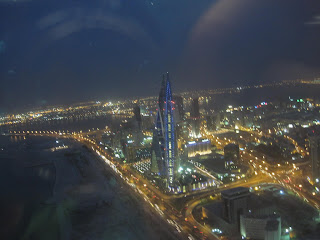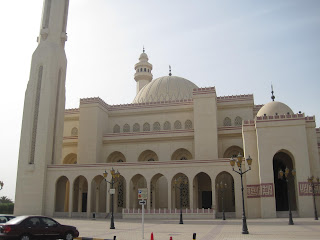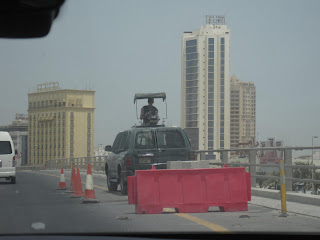One of the first things I observed traveling to a "conflicting" area was the flight. It could probably hold about.... 200 people? I think total there were maybe 15 of us? The attendants even hand-delivered our snack lunches and drinks.
I'll try to NOT go on my typical tirade about how US airlines are horrible, they jam-pack you in the flight, flights are always overbooked, AND they don't EVER serve you anymore. Not even peanuts! My mom went on a 7 hour flight to Hawaii and got one cup of water. I think ALL of my travels on this trip, and trust me, there have been at least 2 dozen, I've gotten food and drinks even if it is less than an hour. This flight was a perfect example. THAT is service for you! And that is what I have to say about that!
Moving on... so my college friend is one that likes his alcohol and imagine how "starved" he was living in Saudi Arabia where there is NO alcohol, no pork, and.... pretty much NO interaction with woman. So his goals were "drink, drink, and drink and talk to a woman." So needless to say, he accomplished his goals! It was funny walking around with him, "wow, look! Knees! Elbows! Woooooooow!" (referring to the woman). He had some VERY interesting stories about life there, and it really is hard to believe. He's lived in China, Korea, been to India, etc and he said by far Saudi is the strangest place he has ever lived. If you look at, brush past, or talk to a woman, "you're arm gets cut off and you go to jail." A single man can't go into a mall, a woman cannot walk or travel alone, she has to have a male companion, whether it being her 3 year old son, he has to be there... and on and on. So as you can imagine, since Saudi is so close, the people flock to Bahrain where there is fairly inexpensive alcohol and woman, and life is much less restrictive. The local people hate it because they really take over the city and pretty much act like they own it.
Bahrain, besides being super small, is similar to other Middle Eastern countries. They have cool architecture, luxury malls and hotels, which somehow we ended up eating at several times. Why? We are both budget travelers, but like Dubai and UAE, alcohol can only be served at a hotel. Ah ha! We also went to the Gold Souk (of course every Middle Eastern country has to have a gold city!).
We stayed in Manama, close to the Gold Souk as well as the market area... where, gasp, there was actually rubbish on the ground! Usually everything is squeaky clean, so this was something new!
And then back to tall buildings and lush malls:
We managed to get to the Trader Vic's restaurant which literally INVENTED the Mai Tai, which I had to have, it was delicious! It is a part of the Ritz-Carlton.
A random thing I wanted to do is buy a Starbucks mug for a friend of mine that collects them from different countries. Although that seems random, I've actually met other people that have this travelers collection (I usually collect postcards and local currencies). I figured many of the places I have traveled to she technically could go, but Bahrain? Probably not. So it was my mission to get this! Well, I found a Starbucks all right, but NO mugs! What? Then the manager told us the interesting reason WHY. Well, on the mug was the Pearl Monument, where the March 2011 protests were centered. So basically after the protests ended, the government (literally, the next day) destroyed it... and pretty much any memorabilia with the Monument on it. Although disappointing, thought it was still a good story. Besides that, I also heard that a coin had it on it and they discontinued that coin almost immediately. In the meantime, all the locals rushed to get it for collecting purposes. Ha! BUT, I did see a kinda google earth image of it on the floor of the National Museum, which I am SHOCKED they did not cover it AND at the museum I found the 1 remaining postcard of it. Sucka's! (just kidding!). What was also interesting was to hear how the government is on a mission to find the people who were protesting. So they tracked work records and if they saw that you had a day off that day they interrogate you and if you are found guilty (also lots of pictures were taken too and they used that as evidence), you were immediately deported. I heard Gulf Air employees took a major hit. Another person I met was saying the parking lot where he works used to overflow, and now it is fairly empty. Kinda crazy. And this is months later, and they are still interrogating.
Being that Bahrain is fairly small, the 3ish days we were there were more than enough. Kris brought all his scuba gear with him.... only to find out that they don't really do it anymore. We found ONE shop that had pearl diving, BUT "wasn't going all of that week because of high winds." Darn the high winds. Whatever. So we were both disappointed, but what can you do? So much for Bahrain being the "pearl" of the Arabian Gulf! We definitely still kept ourselves busy, but it would have been nicer to have some $$ from the pearls! :-)
One night we went to this one hotel (of course) called Gulf Gate Hotel and they supposedly had 3 bands, a Philipino one, a Russian one, and a local Arabic one. We went to the traditional one first and saw the electric "oud" which Kris was familiar with, I wasn't.
It was nice music, especially while having some shisha:
I have to say, music was nice, but it was more interesting to people watch. We were the only Westerners there with mostly all Saudi's. Tucked at the side though were local woman, dressed in the full "abaya" (the traditional wear, the all black outfit)... smoking shisha and drinking under the "hijab" (or the face and head covering thing). Ha! One of them even got up to dance! I guess you had to be there, but Kris was almost beside himself because you definitely don't see that in Saudi! Anyway, then we went to the Russian band... which was pretty much a cabaret show, and the Philipino "band," which was 2 girls singing karaoke. It was a funny and random evening out.
The last day we met up with some of his work friends that had come up for the day to have an "all you can eat and drink" buffet, which was amazing! Kris took it a little too literally and "got his money's worth" with both of those... and also managed to spill 2 drinks and break one glass. Ahh... good times.
As Kris had to go back home to work, I went for a night to stay with a couchsurfer! I stayed with this summer nice couple (Chilean and Italian) and they took me around to the bigger sites of Bahrain... the Bahrain Fort, which was built by the Portuguese in the 1590's:
Then to the Bahrain Traditional Museum (where we saw the google earth floor plan with the Pearl Monument),
Above: That's it! The infamous Pearl Monument... which is no longer there :-(
Above: Traditional wedding dress
Above: traditional burial mounds
This 1932 Buick was given as a gift to celebrate the 60th anniversary of discovering oil. It was donated to the Bahrain in 1992.
And finally to the Al Fateh Grand Mosque, the biggest in Bahrain! Fortunately, it allowed non-Muslims to enter and we had a nice tour as well.
Above: according to Nes, the "holy light" was looking down at us. Hahah!
All of these sights... we were pretty much the only tourists. It felt "business as usual" besides the lack of people around (could also be due to the extreme heat!). But then again, okay fine, I guess the large army tanks with a rifle pointing at the street wasn't so normal, but still!
So there you have it! I survived (take that political activists!) and had a nice time! It's back to Dubai next and ... da da dum, most likely (heheh) home in a couple of weeks!! Eeek!
- - - - - - - - - - - - - - - - - - - - - - - - -- - - - - - - - - - - - - - - - - - - - - - -- - - -- - - - - - - - - - - - -
NEWLY ADDED INFO: So when I was in Oman (a couple of weeks after Bahrain), I met an American Wall Street Journal journalist, and he was heading there and wrote this informative and more informational article about it. I wanted to include the article he wrote about Bahrain at this time, May 2011! (a little more professional than mine!):
MANAMA—On the surface, life seems to be returning to normal in this troubled city as Bahrain lifted martial law on Wednesday in the hope of reviving the economy six weeks after crushing anti-government protests.
Business slowly returns to Government Avenue, Manama's high street. In the souk, tucked behind a British-built gate, just a few locals have come to shop. Three women in black abayahs pressed against the window of a gold shop on an empty street, ogling expensive jewelry. A bored vendor found few takers for his bananas in the shadow of a tiled mosque. A textile merchant folded his wares without a customer in sight. A few people trickled into re-opened banks.
Tourists, who bring an important share of Bahrain's income, aren't to be found. Gulf Air, the national carrier, had to lay off 200 workers on Monday.
“Some Saudi tourists are coming back,” a clerk in a largely deserted downtown hotel says. But behind him the hookers are languishing at the empty hotel bar, desperate for clients.
“Did you expect to find trouble here?” the clerk asks. “There is no trouble. It was all made up by the [international] media.”
The illusion of returning normality crumbles at what was the Pearl Monument roundabout. Armored personnel carriers block streets to where the monument once stood, a homage to the pearl trade that until the 1930s enriched this island nation. Soldiers emerged to tell a visitor to leave.
The six twisted arms holding an enormous pearl was razed—a victim to a so-far defeated revolution. Erasing memory of the revolt, souvenir models have been removed from tourist shops. Postcards with its image, on sale as recently as three weeks ago in the National Museum, are gone. Even a coin with the exalted pearl on the reverse has been taken out of circulation.
The roundabout will become a thoroughfare leading to the King Fahad Causeway, the 25-kilometer link to Saudi Arabia, from which 4,000 Saudi troops arrived in March to help quell the revolt. They are staying indefinitely, along with a contingent of UAE troops, the government said.
The roundabout was the epicenter of the only current Arab uprising to be suppressed. Security forces of the Sunni government in February and March clashed with demonstrators there, officially killing 20. The protestors, mostly Shia, who make up 70% of this country's 1.2 million people and claim job discrimination, say the death toll is higher. More than a thousand were arrested and many tortured, according to Human Rights Watch.
Despite lifting martial law, National Guard units continued to block access to Pearl roundabout on Wednesday evening and still manned the entrances to the hospital. A group of about 15 protestors, several women in black abayahs and young men holding a Bahraini flag assembled several blocks from the roundabout but dispersed before attempting to challenge the guardsmen.
King Hamad bin Isa Al Khalifa ended martial law in the hope of reviving tourism and foreign investment after Moody's downgraded Bahrain's debt and four financial services firms said they were leaving. Internet restrictions have been lifted, including anti-government Facebook pages. But Iran's Press TV website remains blocked, its homepage replaced with a notice that it is in “violation of the laws of the Kingdom of Bahrain.”
The king has called for unconditional, national reconciliation talks with the opposition to begin July 1. But full democracy here would likely lead to a Shiite-led government, increasing the influence, if not dominance, of Iran in a country that hosts America's Fifth Fleet. It would also threaten the Sunni al-Khalifa dynasty, rulers since 1783. The government blames Teheran for the uprising, a charge rejected by Iran and the opposition.
“These people have nothing to do with Iran,” says Hassan, a cab driver, giving only his first name. Hassan, who like most Shiites here speaks Farsi, also studies the writings of Ali al-Sistani, a leading Shiite cleric in Iraq whom he holds in the same esteem as Ayatollah Khaemeini, Iran's theocratic ruler.
The government has offered no evidence of Iran's involvement. In the 1980s, Iranian-backed terrorists struck Gulf nations. But Iran has since been pragmatic in the Gulf to secure shipment of more than 2m barrels of oil a day.
The government claims medics are Iranian sympathisers atSalmaniyya hospital, scene of March protests. More than 80 doctors and nurses were arrested, some tortured and some released, according to Physicians for Human Rights.
A tank still blocks the hospital's main entrance, with barbed wire and troops at the other entry points. Soldiers stopped a cab a hundred metres from the emergency room entrance, forcing a visitor to walk. On the way out soldiers demanded identification and the reason for their visit.
“Is this a hospital or a war castle?” asked Hassan. “Can you imagine bringing sick people here?”
Hassan won't say if he took part in the protests. It could land him in jail. Locals say authorities are arresting or dismissing workers who took days off during the biggest rallies.
“The government says this is a democracy, but how long will the king and the prime minister stay in power?” asked Hassan. “Why can't they just let the people peacefully protest?”
Outside the National Museum, where a room is devoted to burial mounds of Bahrain's ancient Dilmun empire, Hassan says the island was then considered paradise, where people from all over the Gulf were buried. Asked if Bahrain were a paradise today, he said yes, for the Sunni rulers.






























